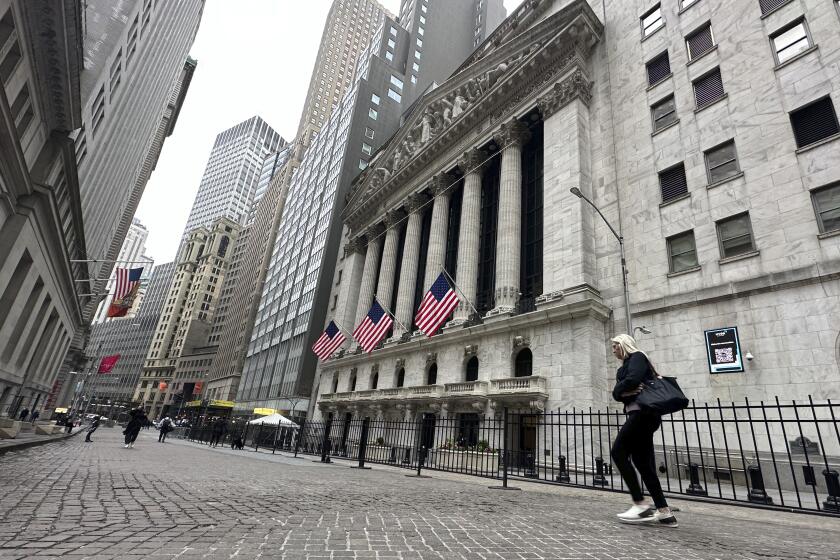Local ’92 Business a Roller-Coaster Ride : Economy: Plant closings, loss of jobs, scramble for commercial work come with a defense slowdown. Some technology enterprises see a brighter side.
General Motors’ sprawling Van Nuys plant is now empty. Independence Bank, once the region’s largest, is closed. So is Valley Federal Savings & Loan.
Those three institutions, once among the most dominant enterprises in the San Fernando Valley region, are now history. Their demise in 1992 underlined the region’s difficult business climate during the year, a climate that reflected the weak Southern California economy overall.
Adding to the weakness was the continued paring of the region’s defense industry, which has been merging plants, cutting jobs and scrambling for commercial work to offset the slowdown in U. S. defense spending.
In the latest example, GM’s Hughes Aircraft unit early this month said it is relocating the headquarters of its missile systems division from Canoga Park to Tucson, Ariz. That raised fears among the division’s 1,900 engineers and administrative workers that the company would move the entire Canoga Park operation to Arizona. Hughes is already relocating missile programs it acquired in September from General Dynamics Corp. to Tucson.
The riots in early May also caused problems for several modest shopping centers and other retailers, but generally the region’s businesses were spared the enormous damage inflicted on central Los Angeles.
The real estate industry also took it on the chin this year as residential housing sales and commercial leasing activity remained in the doldrums.
From April through September, resale of existing single-family houses and condominiums in the San Fernando Valley showed double-digit percentage declines every month, compared with year-earlier levels. In October and November, sales edged up only 3% and 2%, respectively, according to the San Fernando Valley Board of Realtors.
Nevertheless, the region’s inventory of unsold, listed properties totaled a near record 12,674 in November--and even that number is misleading because analysts say the residential real estate market is so poor that many homeowners don’t even bother to put their properties up for sale.
One home builder, Griffin Homes in Calabasas, filed for bankruptcy reorganization in March. Office “for lease” signs peppered Ventura Boulevard. Glenfed Inc., its huge Glendale Federal Bank unit saddled with sour real estate loans, was threatened with government seizure.
Despite those problems, two huge real estate developments marched ahead. Developers got permission late in the year to proceed with the Warner Ridge office and condominium project in Woodland Hills. And earlier this month, plans for a 5,400-acre mini-city in the Simi Hills, called the Ahmanson Ranch, were approved by the Ventura County Board of Supervisors. The project is being developed by Ahmanson Land Co., a unit of H. F. Ahmanson Inc., which also owns Home Savings of America, the nation’s largest thrift.
There were other bright spots in the local business scene. Amgen Inc., the biotechnology drug maker based in Thousand Oaks, continued to dominate the industry and reported soaring profits and sales. Its net income through the first nine months of 1992 surged nearly sixfold from a year earlier, to $223.8 million, while its sales jumped 66% to $784.9 million.
This year also marked strong rebounds for two once-ailing firms, California Amplifier Inc. and Dolco Packaging Corp.
California Amplifier, a Camarillo maker of telecommunications gear, said profit for the nine months that ended Nov. 28 more than doubled from a year earlier, to $2.2 million, while sales surged 85%, to $25.4 million.
Dolco, a Sherman Oaks-based plastics packaging concern that was in bankruptcy court 18 months ago, posted a $1.4-million profit through the first nine months of 1992, compared with a $3-million loss a year earlier.
Meanwhile, two health insurers, Blue Cross of California and Health Net, both based in Woodland Hills, also posted strong financial results this year. Blue Cross also announced plans to sell 18% of its managed-care business to the public via a $400-million stock offering. And Health Net converted from nonprofit to for-profit status, paving the way for the health management organization to also raise cash on Wall Street.
Several other companies successfully completed initial sales of stock to the public, including Calabasas-based restaurant operator Cheesecake Factory Inc., nursing-home operator Summit Care Corp. in Burbank and apparel maker Authentic Fitness Corp. in Van Nuys.
Success in 1992 was evasive for many other companies, however.
General Motors, plagued by mismanagement for a decade and burdened with overcapacity and slumping sales, closed or made plans to close more than 20 plants. One was its assembly plant in Van Nuys, which ended auto production in Southern California when it shut down Aug. 27.
The 45-year-old factory, which in the past decade had built Chevrolet Camaros and Pontiac Firebirds, employed about 2,600 people. GM expects the 101-acre site to be put up for sale as early as January.
Independence Bank, based in Encino, vanished in January after it was seized and closed by federal regulators, who said the bank was insolvent and controlled by the scandal-ridden Bank of Credit & Commerce International. Customers’ deposit accounts at Independence were transferred to other banks.
Valley Federal Savings, a 67-year-old institution, disappeared April 10 when the government arranged to sell the Van Nuys-based S & L to another thrift, American Savings Bank. Valley Federal, with 22 branches, had also been battered by loan losses that left it without sufficient levels of capital to guard against future problems.
Some other companies kept operating even though they have monumental problems and sought refuge in bankruptcy court. They included GI Industries Inc., the largest hauler of residential trash in eastern Ventura County; AME Inc., a Burbank-based video post-production house for the movie studios, and DAK Industries Inc., a once-thriving Canoga Park marketer of mail-order consumer electronic gear.
Two personal-computer companies, Packard Bell Electronics Inc. in Chatsworth and Tandon Corp. in Moorpark, have so far avoided bankruptcy court but are still hurting. In May, Packard Bell had to scuttle a $70-million initial public stock offering, and the next month it lost a major customer: Price Co., which operates the Price Club discount chain.
Tandon, meanwhile, lost $42.3 million on sales of $249.5 million in the first nine months of 1992. So in November, the company said it planned to end most of its U. S. operations and focus solely on European markets, where most of its computers are already sold. Tandon also plans to meet with its creditors in late January to restructure its debt and avoid having to file for bankruptcy court protection.
Cherokee Inc., a Sunland maker of casual apparel, also skated close to bankruptcy this fall after it missed an $8.2-million debt payment. But the company, which is struggling under total debt of $163 million, then reached agreement to restructure the debt in a deal that would cede majority control of Cherokee to its debt holders.
Other struggling businesses showed their top executives the door during 1992, including John J. Keating, who under pressure resigned as president of CU Bancorp, the Encino-based parent of California United Bank. Six months later, CU’s chief financial officer, Robert J. Vecci, also resigned because the new president, Stephen G. Carpenter, said the bank “needed different talents.”
In Chatsworth, Steve Zuloff and Barry Benjamin, the top two officers of With Design In Mind International Inc., were ousted by the novelty gift company in mid-June. Two months later, the company alleged in a lawsuit that the pair embezzled $2.1 million; the suit was settled out of court this month with Zuloff and Benjamin neither admitting nor denying any wrongdoing.
Financial “irregularities” at Huntway Partners L.P., meanwhile, prompted the Valencia-based producer of liquid asphalt to fire its chief financial officer, Douglas Hansen.
He’s been unavailable to comment on the problem, which is being investigated by a special committee of Huntway directors.
In the courts, some major legal battles ended.
In July, for instance, Lockheed Corp. settled legal claims filed on behalf of 624 of its Burbank assembly workers, ending a five-year battle over the workers’ allegations that the Calabasas-based aerospace concern failed to protect the workers from harmful chemicals.
The workers, or in some cases their heirs, will receive cash from Lockheed, but specific terms of the deal were not disclosed.
The workers also have claims pending against the makers of the chemicals; that case is now being heard in court.
And in the regulatory arena, the giant citrus cooperative Sunkist Growers Inc. in Sherman Oaks suffered a temporary blow earlier this month when outgoing U. S. Agriculture Secretary Edward R. Madigan lifted Sunkist-supported marketing orders that dictate how many naval oranges and lemons from California and Arizona can be sold for the rest of the season.
The action, which Madigan said could benefit consumers with lower prices, would have applied to citrus harvested through next spring unless overturned by the incoming Clinton Administration. But Sunkist and eight growers quickly got a federal judge to issue a restraining order blocking Madigan’s decision pending a hearing today.







